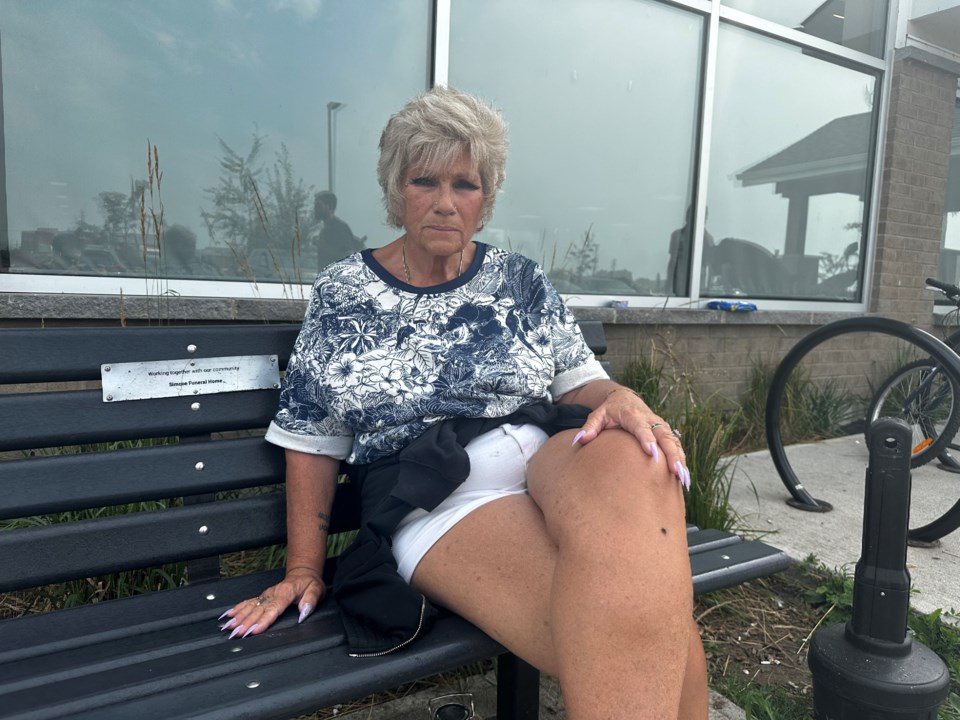A woman staying at the Lighthouse will soon find herself back on the streets.
Jennifer Scaglione has been staying at the emergency shelter over the past few months, but was recently informed her access to the shelter program will be suspended from Aug. 4 through November 3, 2024.
The 64-year-old lives with Parkinson’s disease, and said she is “devastated” that she’ll be on the streets as of Sunday.
“I'll be on the curb with what I have on, and that's all I can do. I have no place to shower, no place to do my teeth, no place to sleep,” she told OrilliaMatters. “At 64, I'm not built that way to live in a tent.”
In order to stay at the Lighthouse, Scaglione signed an intake package that outlined participant expectations, which she was informed she did not meet via a letter from Lighthouse staff on August 1.
“While staying at the Lighthouse you were not housing focused,” the letter reads.
As per an earlier letter on July 15, the Lighthouse required her to show her most recent 30-day bank statement, evidence she had applied to a minimum of four units and contacted eight landlords, and that she had been working on her “housing portfolio” (credit score, a budget, references, etc.).
Scaglione said she failed to meet these expectations because she refused to show staff her bank statements, and that issues with her bank account — which is currently locked — have prevented her from moving to the United States, where she said she can access housing.
She has since opened a new bank account, but is still working on getting money from her pension deposited into the new account — at which point she plans on moving south.
“It's just very, very hard because I don't deserve to be kicked out,” she said. “I told them I have a place. I'm not going to look for a home when I have a home to go to, and they said ‘Well, you have to anyway.’
“I feel that they're not taking into account my illness. They're not taking into account that my bank accounts are frozen. I just feel so alone.”
Scaglione also expressed frustration that some Lighthouse residents have been at the shelter for a year or more, while she’s been asked to leave after a few months — something she said she has seen happen to other residents at the shelter.
Suspending residents from shelter services is not a regular occurrence, but it does happen on occasions where they do not make efforts to find housing over the course of their stays, Lighthouse officials told OrilliaMatters.
“As a housing-focused shelter, when you're coming into shelter you have an intake, which … has all the expectations,” said Linda Goodall, the executive director of the Queen Street facility.
She said residents work with shelter staff to track down housing leads, replace government identification, meet with Ontario Works or ODSP, and more, to move residents from the streets and into permanent housing.
“Some people do not follow those expectations. They don't meet with their housing navigators on a regular basis,” she said. “We will give a letter to say you're not meeting your expectations; you have a couple of weeks to be able to meet those, and we want to be able to work with you because we don't ever want anybody on the street.”
She said some residents do stay at the shelter for longer periods of time, but regularly work with the housing navigator, find work, and do other things to prepare for housing — which can be difficult to find in today’s market.
“(There’s) a lot of stigma, and there is the lack of affordable and attainable housing, so that's probably the No. 1 thing,” Goodall said.
With constant demand for shelter space in the community, the Lighthouse’s beds are consistently full, and Goodall said beds are prioritized for residents actively seeking housing.
“If a participant is not actively involved and participating in looking for housing, then we move on for a short period of time,” she said. “We call it a ‘self-discharge’ because they've made the decision to not follow through on the goals that they need to reach."
Goodall said staff "want to find the housing with them, and they're making that decision not to.”
However, a variety of Lighthouse services — such as its outreach program — are available to residents who have been suspended from its shelter services temporarily, and Goodall said these residents are free to access shelter services again once that period is over.
“Just because somebody is not able to continue staying with us in the shelter, that doesn't mean that they're unable to access our services,” said Rosemary Petersen, managing director of The Lighthouse. “We will still absolutely support them.”
Petersen said staff understand people may be in “survival mode” when they arrive at the shelter, and require some time to get back on their feet, but that residents are ultimately expected to work towards attaining their own permanent housing goals.
“We’re not a permanent place to stay. We need to be a stop in someone’s journey,” Petersen said. “We understand that it takes, sometimes, a few days of rest … to be able to move forward, but … we're not permanent.”




